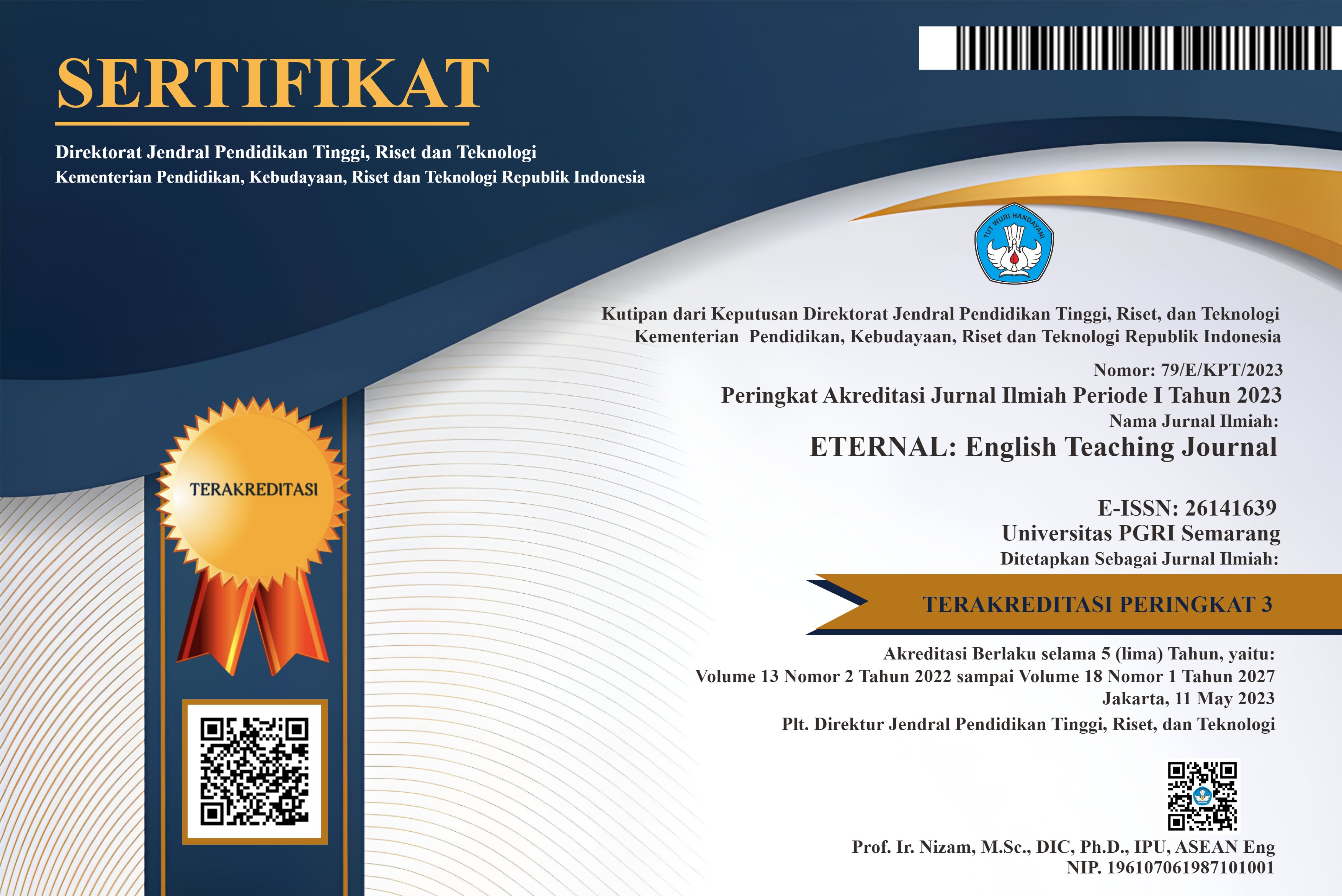Analysis of EFL Learners' Writing Challenges in the Digital Era
DOI:
https://doi.org/10.26877/eternal.v15i1.376Keywords:
English Writing Challenges, EFL Learners, Digital EraAbstract
The Writing Intensive Course emphasizes fundamental English writing elements, providing a prime chance for students to improve written communication. Educators face challenges in enhancing expressiveness, but the large millennial class size, familiar with digital technology, presents a potential advantage. Millennials, as digital natives, show enthusiasm for digital-context learning, offering an opportunity for effective instruction in writing. The primary objective of this research is to find out the problems or challenges students undergo while learning to write English in the digital era. This quantitative research examined 174 EFL students to give particular responses that work with brief reviews of their challenges in English writing. Unable to express (10.9%), improve skills (9.8%), and develop ideas (5.2%) in writing stand strong as the biggest three difficulties in English writing. The diverse challenges, collected from participant samples, reveal consistent issues for both active and nonactive students. The study emphasizes the value of digital-assisted courses, offering hope for enhanced English writing and communication skills among SL/FL learners in a more accessible and effective manner. In brief, this study highlights internal factors as the primary challenges in writing class, with students struggling with self-expression, doubts about improvement, and generating ideas. Various challenges, including optimizing roles and feedback, underscore the importance of addressing obstacles for enhanced writing proficiency in digital-assisted courses
References
Aghayani, B., & Hajmohammadi, E. (2019). Project-Based Learning: Promoting EFL Learners Writing Skills. LLT Journal: A Journal on Language and Language Teaching, 22(1), 78–85.
Ahmed, S.B., & Mani, K.R. (2021). Most Common Problems of ESL Learners in Writing: An Analysis. Global Journal of Scientific and Research Publications (GJSRP), 1(4), 15-19
Al Mukhallafi, T. R. (2022). The Impact of Information Technology on Developing Creative Writing Skills and Academic Self-Efficacy for Undergraduate Students. International Journal of English Linguistics, 12(1).
Alanazi, M. H. (2020). The predictive effects of self-regulated writing strategies on writing performance of Saudi EFL university students. Journal of Educational and Psychological Studies [JEPS], 14(4), 668–678.
Aldabbus, S., & Almansouri, E. (2022). Academic Writing Difficulties Encountered by University EFL Learners. British Journal of English Linguistics, 10(3), 1-11
Fareed, M., Ashraf, A., & Bilal, M. (2016). ESL Learners’ Writing Skills: Problems, Factors and Suggestions. Journal of Education and Social Sciences, 4(2), 83-94
Harisma, I., Ilmiah, G., & Yana, Y. (2019). Improving Students' Writing Ability through Project-based Learning Using Visual Media. Project. Professional Journal of English Education, 2(3), 364–370.
Hyland, K. (2019). Second Language Writing. Cambridge University Press.
Ivanova, I. (2020). Making Sense of Research: University Students’ Difficulties in Writing Academic Summaries. Studies in Linguistics, Culture and FLT, 8, 16-34
Kizilcec, R. F., Pérez-Sanagustín, M., & Maldonado, J. J. (2017). Self-regulated learning strategies predict learner behavior and goal attainment in Massive Open Online Courses. Computers & Education, 104, 18–33.
Koh, E. T., Owen, W. L., Koh, E. T., & Owen, W. L. (2000). Descriptive research and qualitative research. Introduction to Nutrition and Health Research, 219–248.
Lan, Y.-F., Hung, C.-L., & Hsu, H.-J. (2011). Effects of Guided Writing Strategies on Students’ Writing Attitudes Based on Media Richness Theory. Turkish Online Journal of Educational Technology-TOJET, 10(4), 148–164.
Mostafa, N. M., & Alghamdi, J. (2022). Effectiveness of Learning Management Systems in Developing Essay Writing Skills as a Form of Creative Writing for Undergraduate Students in Saudi Arabia. International Journal of Education and Practice, 10(4), 393–410.
Rahmatunisa, W. (2014). Problems Faced by Indonesian EFL Learners in Writing Argumentative Essay. English review: Journal of English Education, 3(1), 41-49
Rinda, R. K., Novawan, A., & Miqawati, A. H. (2018). Students’ perspectives on social media-based learning of writing through Instagram. Journal of English in Academic and Professional Communication, 5(1).
Rofiqoh, R., Basthomi, Y., Widiati, U., Puspitasari, Y., Marhaban, S., & Sulistyo, T. (2022). Aspects of writing knowledge and EFL students’ writing quality. Studies in English Language and Education, 9(1), 14–29.
Sadauskas, J., Byrne, D., & Atkinson, R. K. (2013). Toward Social Media-based Writing. Lecture Notes in Computer Science (Including Subseries Lecture Notes in Artificial Intelligence and Lecture Notes in Bioinformatics), 8013 LNCS (PART 2), 276–285. Springer Verlag. https://doi.org/10.1007/978-3-642-39241-2_31
Sadauskas, J., Byrne, D., & Atkinson, R. K. (2015). Mining Memories: Designing a Platform to Support Social Media-based Writing. Proceedings of the 33rd Annual ACM Conference on Human Factors in Computing Systems, 3691–3700.
Vie, S. (2015). What’s going on?: Challenges and opportunities for social media use in the writing classroom. The Journal of Faculty Development, 29(2), 33–44.
Wijayanti, Y. (2017). Model Project Based Learning untuk Meningkatkan Keterampilan Menulis Sejarah Wanita pada Mahasiswa. Sejarah Dan Budaya: Jurnal Sejarah, Budaya, Dan Pengajarannya, 11(1), 130–140.
Yulianawati, I., Saleh, M., Mujiyanto, J., & Sutopo, D. (2022). The effectiveness of writing techniques in improving students’ writing ability with different self-esteem. Studies in English Language and Education, 9(1), 30–44.







